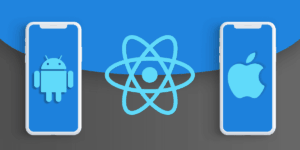In the digital space, businesses are seeking more innovative solutions to boost their comparative advantage and optimize their digital presence. One such solution is cross-platform app frameworks that allow the creation of both Android and iOS apps on a single codebase. Not only will this save time, but it will also expand a company’s reach for a fraction of the price.
React Native is one of the most popular – and arguably the most preferred – cross-platform frameworks for building a mobile application across various platforms. Developed by Facebook, the React Native cross-platform framework allows you to work on different operating systems using a single platform.
Before the release of React Native, businesses had to use different applications for iOS and Android platforms, requiring different programming languages. Conversely, React Native lets you create native apps using only JavaScript language that code to multiple platforms. It provides tools for developers to write native codes in languages such as Objective C or Swift for iOS and Java for Android to add to its flexibility. Using React Native, developers can build applications with attractive User Interfaces, which are indistinguishable from a native app.
Let’s examine the benefits of React Native that are making it a popular choice among developers.
Table of Contents:
#1: Code Reusability
#2: Cost-Effective Framework
#3: Community-Driven
#4: Live and Hot Reloadings
#5: Modular Architecture
#6: Wide Array of Free Built-In Solutions

Source: Mindinventory
1. Code Reusability
The ability to reuse code is one of the biggest benefits of using React Native for your app development. React Native allows you to use the same code for building both iOS and Android applications. Code reusability saves you a tremendous amount of time – almost cutting the development time by half.
Having almost 90 percent of the code reusable across platforms also makes React Native a good run for your money, potentially saving you the cost of building separate applications on various platforms.
What’s more, React Native also allows you to reuse web application codes for building your mobile app.
2. Cost-Effective Framework
As discussed above, the cost reusability of React Native makes it highly cost-effective. Developers don’t need separate codes or languages to create apps for both platforms. Both operating systems can be coded with a single programming language, reducing the number of developers required and, in turn, the cost of development.
React Native has other benefits that help speed up the development process and lower the cost of development. For instance, React Native allows you to reuse existing components that can be retrieved at any time. This functionality obviates the need for using multiple platform-specific components.
React Native applications also integrate easily with compatible mobile apps, removing the burden of integration work on developers and, ultimately, lowering the cost of that.
Another reason why React Native is cost-effective is its easy maintenance. This framework has a structure that makes upgrading an existing application easy and in record time.
What’s more, React Native also offers the ability to work offline, reducing the cost of the internet connection. With the capacity to store the mobile device’s API offline, access to data for testing can be done offline, speeding up the development process, and cutting costs.
3. Community-Driven
React Native has become a community-driven technology as it is an open-source framework that grants free access to the worldwide developers’ community. These developers can freely contribute to the framework and share their catalogs of components freely.
This support remains invaluable for any developer who gets stuck at any stage of their app building process. You can also connect with other developers, share your experiences and portfolios with them, and even learn better coding and programming skills from them.
Since React Native was produced by Facebook, you also enjoy extended support from the Facebook support team. Facebook has created a platform to accommodate interactions with developers to solve their problems and communicate best practices of React Native.
4. Live and Hot Reloading
One of the benefits of React Native is its support for Live and Hot Reloading. The ‘Live Reload’ feature enables you to view the results of your code revisions immediately. It also offers an extra tool that automatically reads the app from the beginning to see the effects of your code changes on the app.
The ‘Hot Reload’ feature is based on the Hot Module Replacement (HMR) that puts the updated files in a secure and fixed location even as the app is still running. With the Hot Reloading, you can modify the source code without needing app recompilation to view the codes. With Hot Reload, you will be able to see the outcome of code changes in your app instantly.
5. Modular Architecture
The modular architecture of React Native allows you to segment program functions into free, interchangeable sections called modules. This approach makes app development more flexible and better coordinated. Similar to what developers find in React.js. This modular structure can allow developers to access and build upon someone else’s project. As a result, development becomes more flexible, and updates and upgrades are easier to apply.
What’s more, modular architecture allows developers to understand the programming sequence in less time, leading to valuable time- and cost-savings.
6. Wide Array of Free Built-In Solutions
Being that code is written in advance, React Native also allows you to leverage its freely-available pre-developed components in its open-source library to expedite the development process to produce your product. Furthermore, it has a vast number of libraries that contain useful tools for creating efficient mobile applications.
While the debates about the trade-off points are still on, React Native has no negative trade-offs. Offering optimal performance for mobile platforms, simple UI, and the capacity to create more stable apps, React Native is your go-to framework for developing the best cross-platform apps at nearly half the price.
Schedule a call with us to learn how your app can benefit from using React Native for development.
Related Articles: